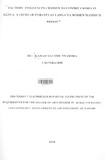| dc.description.abstract | Crime is a major social problem in the world and is as old as human race. Men and women are subjected to the same imprisonment but little consideration has been given to the different needs and problems of imprisoned women compared to those of men. The overriding need of every society is to protect its own existence a feat which is undermined by crime as it impairs the overall development of a nation, undermines spiritual and material well being, compromises human dignity, creates a climate of fear and violence, endangers personal security and erodes the quality of life. While women are seen as nurturing, weak and in need of protection, criminal activities orchestrated by the same is viewed as normal and even some view women who are criminals as being 'mad and judged as having 'uncontrollable sexuality'.
This study thus sought to establish the factors influencing women to commit crime, subsequent meted and the effectiveness of such punitive measures. This study adopted a qualitative research design on women in prison in Langata Women Maximum Prison as unit of analysis from which three focus discussion groups were formed consisting of eight to thirteen members. Content analysis technique was used in the analysis of the data which was then presented in prose in accordance with the order of flow of objectives. The study found that women were driven into crime owing to stress, anger, emotions, temper, family wrangles, economic hardships, poor family background, single parenthood, parental neglect and low education levels.
The study findings indicated that women are likely to commit robbery with violence, stealing, murder, attempted murder, manslaughter, drug trafficking, stealing, unlawful abortion, child neglect, child mistreatment, handling of stolen goods, loitering and hawking. The study recommends that women criminals should be punished fairly, not threatened by police to admit a crime, should be dialogued to rather than punished severely by administering such as community service work, probation, reporting to local chief daily and manual work. | en_US |

